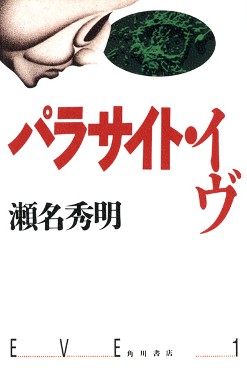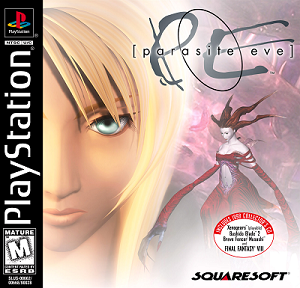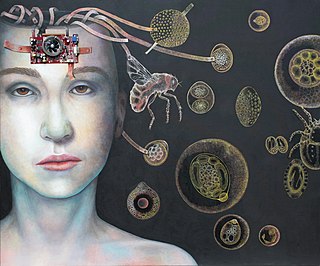Alien primarily refers to:
Eve is the first woman created by God according to the creation narrative of Abrahamic religions.
Nemesis is a Greek mythological spirit of divine retribution against those who succumb to hubris. Nemesis may also refer to:
Titan most often refers to:
Creature often refers to:
Proteus is an early Greek water god.
Mortal means susceptible to death; the opposite of immortal.
Wizard, the wizard, or wizards may refer to:
Hideaki Sena, Ph.D. is a Japanese pharmacologist and novelist. Sena was a graduate student at Tohoku University when he wrote his prizewinning debut novel, Parasite Eve.

Parasite Eve is a Japanese science fiction horror novel by Hideaki Sena, first published by Kadokawa in 1995. The book was published in North America by Vertical, Inc. in 2005.
Eve of Destruction may refer to:
Masayuki Ochiai is a Japanese film director. His films include Kansen and Saimin.

Parasite Eve is a 1998 role-playing video game developed and published by Square. The game is a sequel to the novel Parasite Eve, written by Hideaki Sena; it is the first game in the Parasite Eve video game series. The story follows New York City police officer Aya Brea over a six-day span in 1997 as she attempts to stop the Eve, a woman who plans to destroy the human race through spontaneous human combustion. Players explore levels set in areas of New York while utilizing a pausable real-time combat system along with several role-playing elements.
A virus is a submicroscopic infectious agent that replicates only inside the living cells of an organism.
A gamer is one who plays and/or devises games, especially role-playing or video games.
The music of the 1998 role-playing video game Parasite Eve, based on the novel of the same name by Hideaki Sena, was composed by Yoko Shimomura, and was one of her early popular successes. The music for its 1999 sequel Parasite Eve II was composed by Naoshi Mizuta and arranged by Hiroshi Nakajima. The 2010 spin-off title The 3rd Birthday was composed for by Shimomura, Mitsuto Suzuki and Tsuyoshi Sekito. Shimomura's work was described by herself as experimental, and incorporated multiple musical genres including opera music. The score for Parasite Eve was recorded at the Andora Studios in Los Angeles. For Parasite Eve II, Mizuta spent a year and a half on the project, using the game's scenario and visuals as references and taking inspiration from multiple film genres. It was Mizuta's first project after transferring from Capcom to Square Enix. For The 3rd Birthday, Shimomura worked with Suzuki and Sekito to create a score reminiscent of Parasite Eve, while Japanese rock band Superfly provided the theme song "Eyes on Me".

Parasite Eve is a 1997 Japanese science fiction film that was directed by Masayuki Ochiai and is based on the 1995 novel Parasite Eve by Hideaki Sena. Kiyomi, the wife of Toshiaki Nagashima, is left brain dead after a traffic accident on the day of their first wedding anniversary. Nagashima attempts to make Kiyomi live again by making a deal with a doctor who wants to harvest Kiyomi's kidneys for transplanting into a young girl in the same hospital. Nagashima agrees on the condition that he can have his wife's liver. While Nagashima experiments with the organ, the doctor finds one night the samples have emerged as a gelatinous form in the form of Toshiaki's dead wife and reveal themselves as an organization of sentient mitochondria that are bent on making a new species that will wipe out humanity.

Parasites appear frequently in biology-inspired fiction from ancient times onwards, with a flowering in the nineteenth century. These include intentionally disgusting alien monsters in science fiction films, often with analogues in nature. Authors and scriptwriters have, to some extent, exploited parasite biology: lifestyles including parasitoid, behaviour-altering parasite, brood parasite, parasitic castrator, and many forms of vampire are found in books and films. Some fictional parasites, like Count Dracula and Alien's Xenomorphs, have become well known in their own right.
This page is based on this
Wikipedia article Text is available under the
CC BY-SA 4.0 license; additional terms may apply.
Images, videos and audio are available under their respective licenses.



